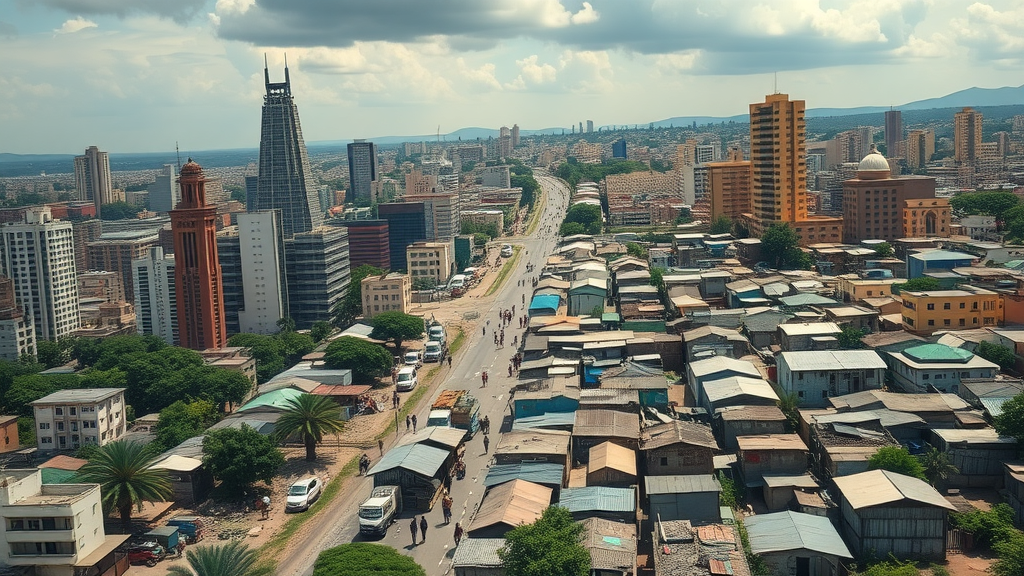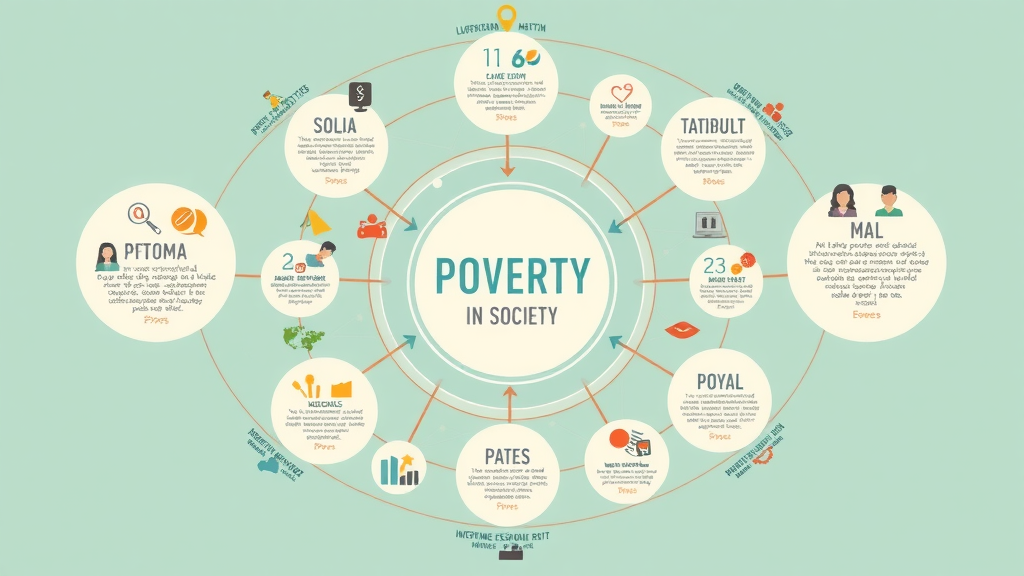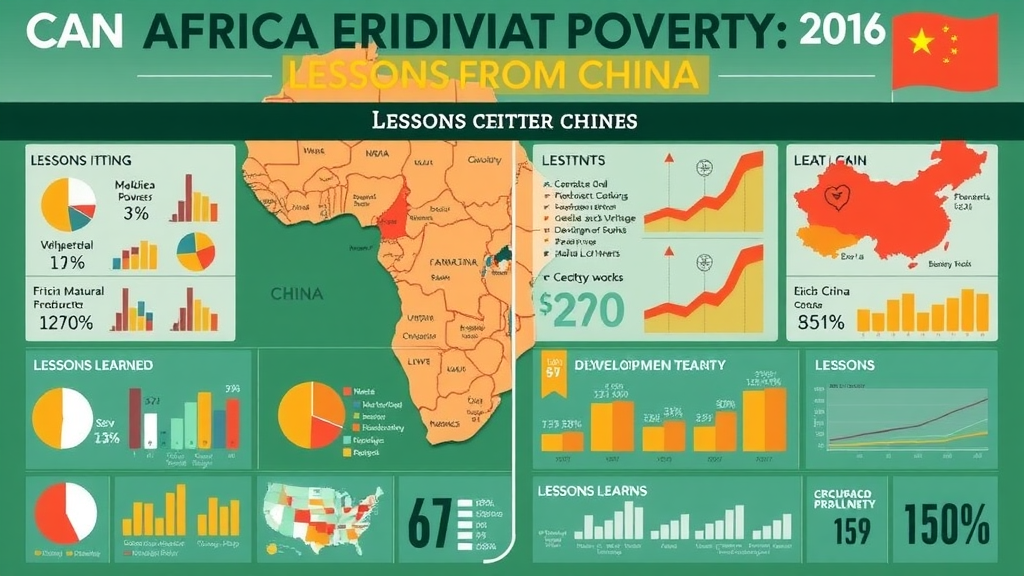Did you know that approximately 60% of Africa's population currently lives in poverty? This staggering statistic reflects the urgent need to address the continuous cycle of poverty in Africa and its devastating impact on economic growth. This article delves into the multifaceted relationship between poverty and Africa's economic landscape while exploring potential solutions for this pressing issue.
Understanding Poverty in Africa
Defining Poverty and Its Dimensions
Poverty can be understood in various dimensions including income, access to basic needs, and overall well-being. The World Bank defines poverty as a condition where a person's income is insufficient to meet minimal living standards; however, in Africa, poverty also encompasses a lack of access to essential services like education, healthcare, and clean water. This multidimensional concept highlights that poverty in Africa is not merely an economic issue, but a socio-political one as well.
Current Statistics on Poverty in Africa
Recent data reveals alarming insights. As of today, over 400 million people in Africa live below the poverty line. Acha Leke, a Senior Partner at McKinsey & Company, points out that Africa's productivity growth plummeted from 2.2% annually between 2000 and 2010 to just 0.8% in the last decade, reflecting the inadequacies of economic systems. The gravity of the situation cannot be understated: if current trends continue, by 2030 over 80% of the world's poorest individuals are projected to reside in Africa.

The Causes of Poverty in Africa
Economic Factors Contributing to Poverty
Economic factors such as low productivity rates, inflation, and unemployment contribute significantly to poverty in Africa. The economies of many African nations are heavily reliant on agriculture, which has been hindered by climate challenges and a lack of investment in modern farming technologies. Additionally, high inflation rates erode the purchasing power of consumers, leading to even more profound economic strain on the populace.
Social and Political Influences
Poverty in Africa is also exacerbated by social and political influences. Corruption, mismanagement, and weak governance systems undermine economic progress. Without effective leadership and accountability, essential resources often fail to reach the most impoverished segments of society, thus further entrenching cycles of poverty.

Environmental Challenges and Climate Change
Environmental challenges play a pivotal role in driving poverty in Africa. Climate change drastically impacts agricultural productivity, with droughts and floods becoming increasingly common. A comment by Acha Leke highlights that investing in climate-resilient agricultural techniques could significantly improve living conditions in rural areas. Furthermore, the rising effects of climate change mean that adapting to these new realities is becoming an imperative, not just for survival, but also for enhancing economic growth.

The Effects of Poverty on Economic Growth
Impact on GDP and Economic Development
The direct correlation between poverty and economic growth is evident. Low productivity levels inhibit gross domestic product (GDP) growth across the continent, stifling the overall development of nations. With a lack of substantial GDP growth, investment in infrastructure, education, and health services dwindles, creating a vicious cycle where poverty perpetuates further poverty.
Social Consequences of Poverty
Socially, poverty leads to increased instability, crime, and social unrest, which discourages both local and foreign investments. Communities ravaged by poverty often witness a decline in social cohesion, hindering collaborative efforts to address common challenges. In turn, this further suppresses economic growth, perpetuating the cycle of poverty.

Long-term Implications for Future Generations
For future generations, the implications of continued poverty in Africa are dire. Lack of investment in education leads to a workforce ill-equipped for the modern economy, while healthcare inadequacies will diminish the population's capacity to contribute economically. This stagnation not only impacts individual lives but also the potential for national development, creating a lost generation that cannot propel their countries forward.

Digital Technology as a Catalyst for Change
Success Stories of Digital Transformation
Despite the challenges posed by poverty in Africa, there are glimmers of hope. Acha Leke emphasizes digital technology as a catalyst capable of transforming productivity across the continent. For instance, Africa now boasts 60% of the world’s mobile banking accounts, which empowers individuals and businesses alike. The digital transformation seen in Togo has demonstrated that government services can be made more efficient, leading to an unprecedented increase in revenue. For more on how digital advancements are reshaping Africa, explore how MSC is revolutionizing trade routes in Southern Africa.

Challenges and Limitations of Digital Solutions
However, while digital technology offers transformative potential, it is not without challenges. Limited access to technology in rural areas and the digital divide can perpetuate existing inequalities. For a true digital transformation to occur, investments in infrastructure, training, and access for all segments of society are paramount.
The Role of Education and Workforce Development
Education remains a crucial component in bridging the gap caused by poverty in Africa. Leveraging digital solutions in education can enable wider access to learning opportunities, particularly for marginalized communities. Programs aimed at upskilling the workforce to meet the demands of a digital economy are essential for sustainable development.

Expert Insights on Addressing Poverty in Africa
Acha Leke's Perspective on Productivity
Acha Leke provides a compelling argument regarding productivity. He states, "Productivity across the board is incredibly low [in Africa]." By addressing and improving productivity, he believes that Africa can turn the tide on the prevailing poverty cycle. The insights from Leke are crucial as they highlight a path that other countries have successfully navigated, learned from, and implemented solutions.

The Importance of a Multi-faceted Approach
Addressing poverty in Africa requires a multi-faceted approach that combines economic policy, social reform, and technological innovation. Leke emphasizes that all stakeholders — including governments, businesses, and civil society — must collaborate to implement sustainable solutions that break the cycle of poverty.
Quotes from Industry Leaders
Experts like Acha Leke remind us that "if we get this right, the biggest export from the continent is no longer going to be our resources. It's going to be our people." This shift towards valuing human capital is explained as essential for Africa's future in a global economy.
Key Takeaways and Actionable Steps
Strategies for Reducing Poverty
- Invest in education and vocational training to enhance workforce skills.
- Leverage digital technology to improve service delivery and access to markets.
- Encourage policies that promote economic diversification beyond extractive industries.
The Role of Policy and Governance
Effective governance is pivotal for implementing policies aimed at reducing poverty. Policymakers must focus on transparency, accountability, and inclusiveness in decision-making processes to enhance public trust and effectiveness.

Community Engagement and Grassroots Movements
Grassroots movements can drive effective change by addressing local needs. Engaging communities in decision-making processes empowers them and creates ownership over poverty reduction strategies. As history has shown, sustainable solutions often emerge from the ground up.
Conclusion: The Path Forward for Africa
To conquer poverty in Africa, a collaborative, multi-faceted approach that leverages education, technology, and community engagement is crucial. While the challenges are significant, the potential for transformative change through increased productivity and innovative solutions offers hope for a brighter future.
People Also Ask
What is the main cause of poverty in Africa?
The primary causes of poverty in Africa include economic instability, poor governance, lack of access to education, and environmental challenges.
What percent of Africa is in poverty?
Approximately 60% of Africa's population currently lives below the poverty line.
What is the poorest country in Africa?
The poorest country in Africa is widely considered to be Burundi, with a large percentage of its population living in poverty.
What is the truth about poverty in Africa?
Poverty in Africa is a complex issue characterized by systemic challenges, low economic productivity, and significant social disparities.
Call to Action
Discover Afridigest
Stay informed on the latest insights and analyses regarding Africa's economy. Subscribe to Afridigest today for regular updates!
 Add Row
Add Row  Add
Add 




Write A Comment